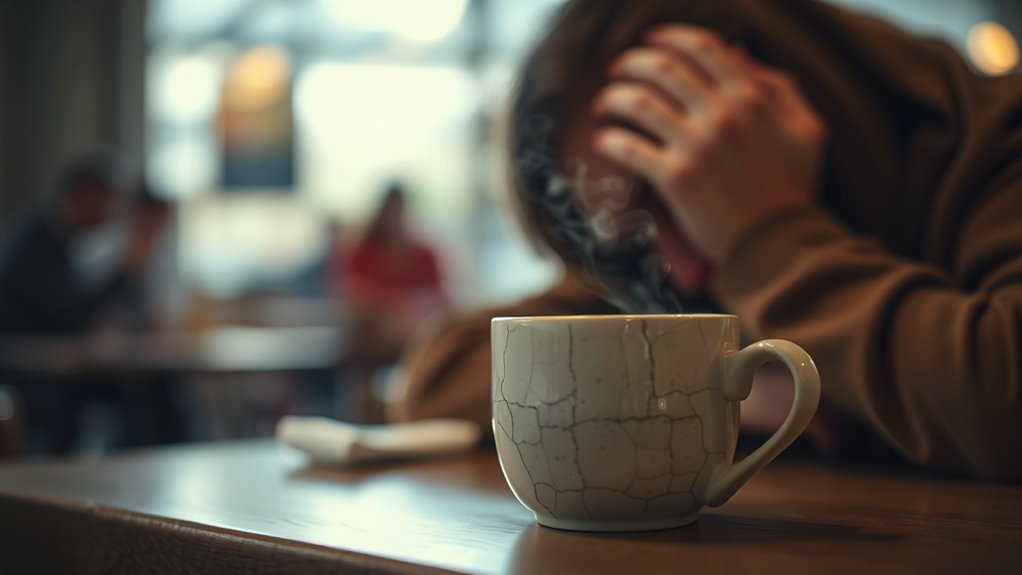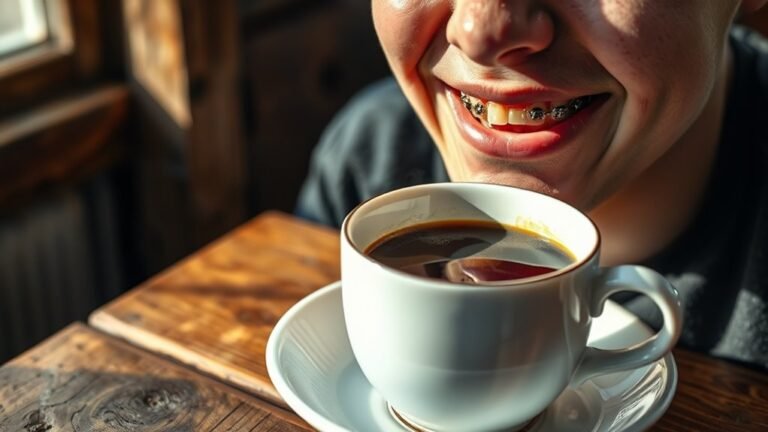Can You Have Coffee With a Concussion
You can have coffee with a concussion, but it’s not advisable. Caffeine may temporarily boost alertness while potentially worsening headaches and anxiety. Withdrawal from caffeine can also intensify your symptoms. Additionally, caffeine acts as a diuretic, which can lead to dehydration, complicating recovery. It’s vital to listen to your body and consult a healthcare professional for personalized guidance. To understand the full implications of caffeine on your recovery, explore further insights on its impact.
Understanding Concussions: What Happens to Your Brain?
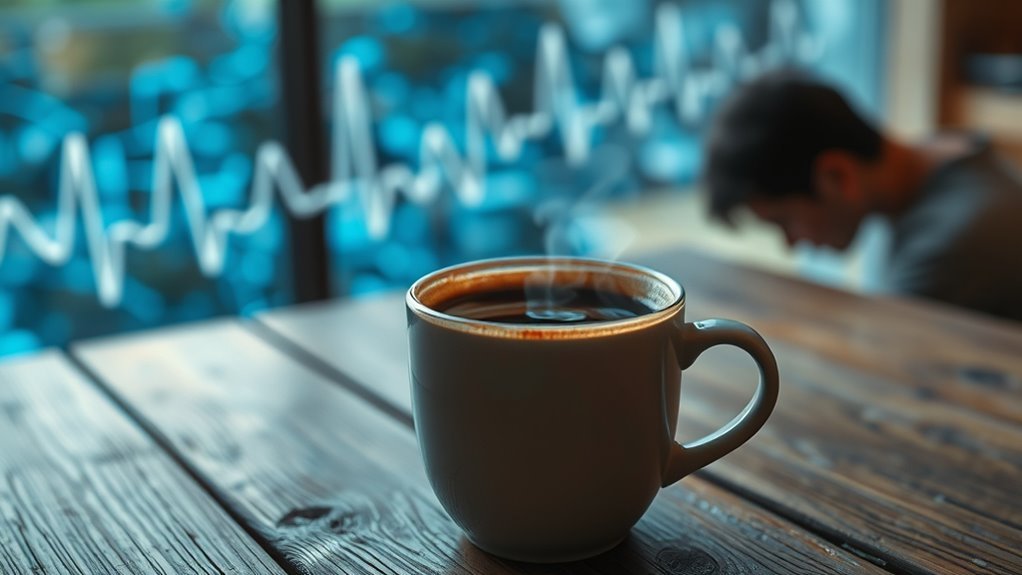
When you experience a concussion, your brain undergoes a series of complex changes that can greatly affect your cognitive and physical functions. This type of brain injury disrupts normal brain activity, leading to symptoms like confusion, memory issues, and difficulty concentrating. Your brain’s neurons may become overstimulated or even damaged, impacting your cognitive function and overall well-being. Inflammation and changes in brain chemistry can further exacerbate these effects, making recovery essential. It’s important to recognize that each concussion is unique, and symptoms can vary widely. As a result, listening to your body and allowing adequate time for rest and healing is imperative. Prioritizing your brain health will empower you to reclaim your cognitive abilities and physical freedom after a concussion.
The Role of Caffeine in the Body
While caffeine is often celebrated for its stimulating effects, it plays a multifaceted role in the body that extends beyond mere alertness. Caffeine metabolism occurs primarily in the liver, where it’s broken down into various metabolites that influence your body’s functions. It interacts with brain chemistry by blocking adenosine receptors, which can enhance mood and cognitive performance. This blockade can lead to increased dopamine levels, contributing to feelings of pleasure and motivation. Additionally, caffeine’s diuretic properties can affect hydration, impacting overall health. Understanding these roles can help you appreciate how caffeine affects your daily life, especially when considering its use during recovery from conditions like concussions. Balancing its benefits with potential risks is essential for maintaining well-being.
Caffeine’s Impact on Concussion Symptoms

Although caffeine can provide a temporary boost in alertness, its impact on concussion symptoms is complex and requires careful consideration. While you might feel more awake after a cup of coffee, caffeine can also exacerbate symptoms like headaches and anxiety. If you’re experiencing caffeine withdrawal, this can intensify those symptoms, making it vital to strike a balance.
Moreover, maintaining your hydration levels is important during recovery. Caffeine is a diuretic, which can lead to dehydration, potentially worsening your concussion symptoms. If you choose to consume caffeine, make sure you’re drinking enough water to stay hydrated. Ultimately, listen to your body and consult a healthcare professional to determine if caffeine is right for your healing process.
Potential Benefits of Caffeine During Recovery
Caffeine may offer some potential benefits during your recovery from a concussion, particularly regarding cognitive function and mood. Research suggests that moderate caffeine intake can enhance alertness and concentration, which might help you feel more engaged during recovery. Common caffeine sources like coffee, tea, and energy drinks can serve as useful recovery strategies when consumed carefully. Additionally, caffeine may improve headache symptoms for some individuals, potentially aiding in overall comfort. However, it’s crucial to balance your intake, as too much can lead to negative effects. Always consult with a healthcare professional to confirm that incorporating caffeine aligns with your specific recovery plan, allowing you the freedom to make informed choices during your healing process.
Risks of Consuming Caffeine After a Concussion
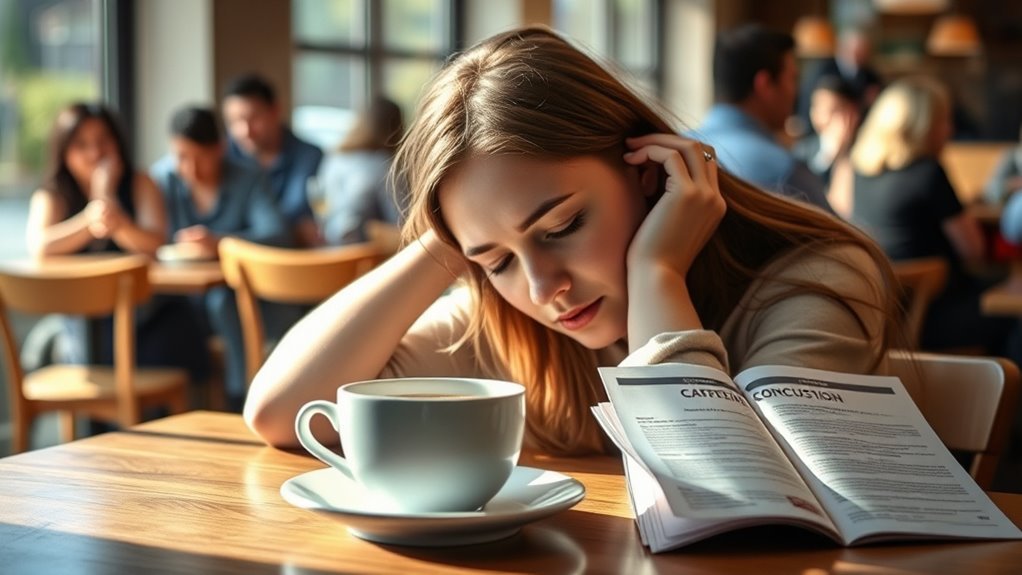
When recovering from a concussion, it’s important to contemplate the potential risks associated with caffeine consumption. While caffeine might seem harmless, it can exacerbate symptoms like headaches and anxiety. If you’re used to consuming caffeine regularly, skipping it can lead to caffeine withdrawal, causing irritability or fatigue. This can hinder your recovery process, as mental clarity is essential for healing. Additionally, caffeine can affect your hydration status. Dehydration may worsen concussion symptoms, so staying well-hydrated is vital. If you’re considering caffeine during your recovery, weigh these risks carefully. It’s best to consult with a healthcare professional to find the right balance between reintroducing caffeine and ensuring your body heals effectively. Your health should always come first.
Individual Factors Influencing Caffeine Tolerance
While various factors contribute to caffeine tolerance, individual differences play a significant role. Your personal health, genetics, and lifestyle choices can affect how your body reacts to caffeine. For instance, some people are more caffeine-sensitive, meaning they feel its effects more intensely and quickly than others. Understanding these factors can help you determine whether you should consume caffeine, especially after a concussion.
| Factor | Description | Impact on Tolerance |
|---|---|---|
| Genetics | DNA variations affect metabolism | High sensitivity levels |
| Health Conditions | Conditions like anxiety alter effects | Decreased tolerance |
| Lifestyle Choices | Diet and sleep influence effects | Variable tolerance |
Expert Recommendations on Caffeine Consumption
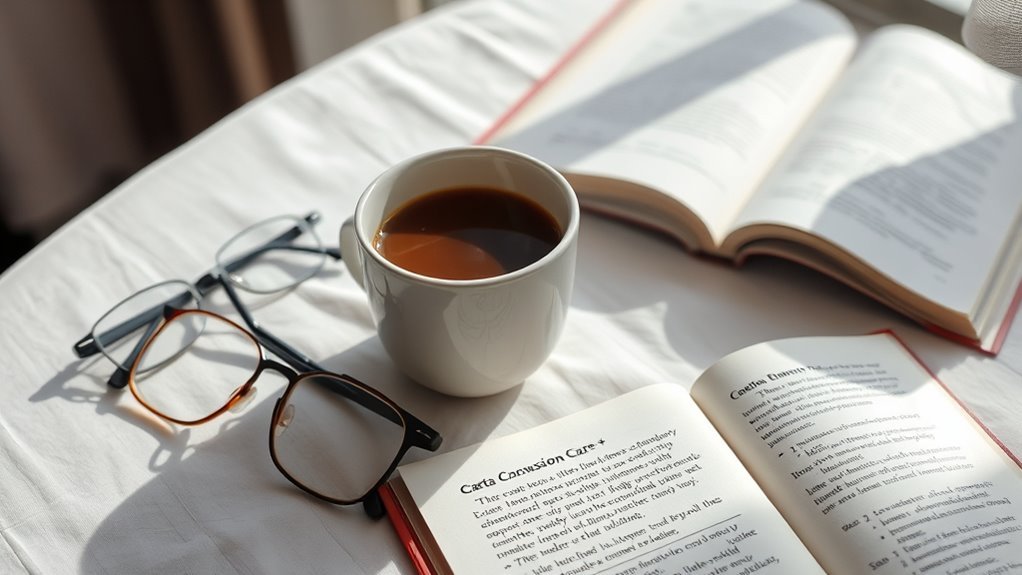
Experts generally advise caution regarding caffeine consumption after a concussion, as it can exacerbate symptoms like headaches and dizziness. While you might crave that caffeine fix, consider its potential effects on your recovery. If you regularly consume caffeine, suddenly stopping could lead to caffeine withdrawal, manifesting as irritability and fatigue—conditions you don’t need while healing.
Instead, focus on hydration importance; staying well-hydrated can help alleviate some concussion symptoms. Drinking water or electrolyte-rich fluids can support your recovery better than caffeine. If you decide to have caffeine, monitor how it affects you. Everyone’s tolerance varies, so listen to your body and consult a healthcare professional for personalized advice. Prioritizing your well-being should always come first.
Alternative Strategies for Energy and Focus After a Concussion
Although caffeine might be tempting for a quick energy boost after a concussion, there are several alternative strategies you can employ to enhance your focus and vigor during recovery. Here are some effective options:
| Strategy | Description | Benefits |
|---|---|---|
| Herbal Teas | Chamomile or peppermint can soothe and energize. | Calming effects, improved clarity. |
| Energy Foods | Opt for nuts, fruits, and whole grains. | Sustained energy release. |
| Mindfulness Practices | Try meditation or deep breathing. | Reduces stress, enhances focus. |
| Hydration Strategies | Drink plenty of water and electrolyte-rich fluids. | Maintains energy levels. |
Incorporating these methods can help you regain your energy and focus naturally, allowing your body to recover effectively.
Frequently Asked Questions
Can I Drink Decaffeinated Coffee After a Concussion?
You can drink decaffeinated coffee after a concussion, but it’s important to take into account hydration. Decaf offers benefits like antioxidants without the caffeine that might exacerbate symptoms. Staying hydrated is essential for recovery, so balance your decaf intake with plenty of water. Just listen to your body; if you feel any discomfort, it’s best to avoid it. Always consult with a healthcare professional for personalized advice on your recovery process.
How Long Should I Wait Before Consuming Caffeine Post-Concussion?
Waiting to consume caffeine after a concussion can feel like an eternity, but it’s key for your recovery. Generally, it’s best to wait at least 24 to 48 hours, as caffeine metabolism can affect your healing process. During this time, focus on rest and hydration. Each person’s recovery timeline varies, so listen to your body; if you’re still feeling symptoms, it’s wise to hold off on that cup of coffee a bit longer.
Does Tea Have the Same Effects as Coffee After a Concussion?
Tea does have some similar effects as coffee after a concussion due to its caffeine content, but it generally contains less caffeine. If you’re looking for a gentler alternative, tea benefits include hydration and antioxidants, which can support recovery. Herbal teas, without caffeine, might be a better choice to avoid potential side effects. Exploring caffeine alternatives can help you manage symptoms while still enjoying a warm beverage during your recovery.
Are There Any Specific Symptoms That Caffeine Could Worsen?
Imagine your head’s a fragile balloon, and caffeine’s a sharp pin. For some, caffeine sensitivity can amplify symptoms like headaches, anxiety, and dizziness, turning mild discomfort into a full-blown storm. It’s a well-known headache trigger for many, so if you’re feeling any of these symptoms, it’s wise to steer clear. Instead of reaching for that cup, listen to your body and consider alternatives that soothe rather than stir. Your head will thank you.
Can I Consume Energy Drinks After Sustaining a Concussion?
You should be cautious with energy drinks after a concussion. Energy drink safety is important, as these beverages often contain high caffeine and sugar levels which can exacerbate symptoms like headaches and anxiety. During concussion recovery, it’s best to prioritize hydration and nutrition over stimulants. Consult with your healthcare provider before consuming energy drinks to guarantee they won’t interfere with your recovery process. Your brain needs rest and care to heal properly.
